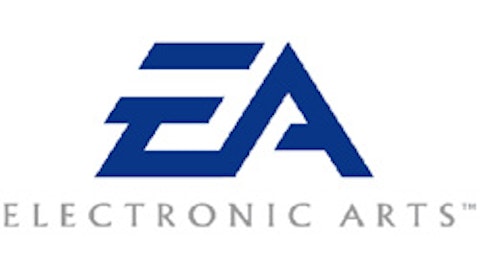The video game industry consistently under-performs the markets, as there are just too many things that can go wrong in the process of video game development.
Stock price performance
Over the past five years, Electronic Arts Inc. (NASDAQ:EA) declined 47.6%, Take-Two Interactive Software, Inc. (NASDAQ:TTWO) declined 41.9%, and Activision Blizzard, Inc. (NASDAQ:ATVI) declined by 15.4%.
Three reasons for why game studios have under-performed:
–The cost of developing games has consistently gone up. All those extra polygons and physics effects require larger teams of developers to pull off. At some point, the cost of game developments gets so huge the total profit margins become compressed and the shareholders are left with much less in terms of earnings. This is why each major game studio only produces maybe 10 games in a year, but each game costs a lot to make.
–A gamer’s budget really isn’t that large. We’re talking about discretionary income here, and while I understand that the overall trend in discretionary income is on the rise, it doesn’t change the fact that the average video gamer is extremely price sensitive. This leads to subsidized used video game purchases. The purchase of used video games generally has a net-effect of reducing the profitability of video game studios, as it opens an alternate market that the video game developers don’t make a single dime of profit off of.
–Game studios become dependent on AAA titles like Call of Duty, Battlefield, BioShock, Grand Theft Auto, and Madden NFL. In the end, why bother taking risks when you can consistently release a series of sequels? Eventually, though, these franchises generate diminishing returns, which can have a nasty effect on earnings over the short-term.
Money spent on game development has declined
Over the past five years, Source: Ycharts, Activision Blizzard, Inc. (NASDAQ:ATVI), and Take-Two Interactive Software, Inc. (NASDAQ:TTWO) have spent less on game development or have not increased spending whatsoever. I used Take-Two Interactive Software, Inc. (NASDAQ:TTWO)’s cost of goods sold (because the company factors game development costs into its COGS, rather than in R&D). So going forward, there isn’t any upside catalyst in these businesses, as these companies haven’t slated themselves for long-term game development. Let me give you a quick example looking at Electronic Arts Inc. (NASDAQ:EA)’ release schedule.

Source: Electronic Arts
Electronic Arts has 14 games slated for launch in 2014, with about half of them being sports-genre games. And 13 out of the 14 games are sequels to pre-existing franchises, indicating that Electronic Arts Inc. (NASDAQ:EA) has turned this into a business of milking a cow rather than developing new games.
This isn’t good because now the company doesn’t have any real upside catalyst. You can’t produce more games with a falling research and development budget. The company is negatively affected by the console refresh cycle. The average gamer will end up spending less money on games in 2013 and 2014 because they have to buy a $400 or $500 console device; the economic trade-off is around eight to 10 games. This will mean that game sales will most likely be down for Electronic Arts Inc. (NASDAQ:EA), Take-Two Interactive Software, Inc. (NASDAQ:TTWO), and Activision Blizzard.
Activision Blizzard may have a bigger issue on its hands
This company has become overly dependent on the World of Warcraft franchise for its revenue. The fact is, World of Warcraft subscriptions have been on a consistent decline over the past couple of years. According to Activision Blizzard, Inc. (NASDAQ:ATVI), the number of subscribers peaked at 10 million in the fourth quarter of 2010. Currently, subscriber figures are in the 8.3 million range. So with 20% of its user base gone, Activision Blizzard, Inc. (NASDAQ:ATVI) needs to go out and create some new gaming franchises (skyrocketing development expenses), and it also needs to introduce new expansion packs.
Analysts on a consensus basis anticipate Activision Blizzard to report a 14% decline in sales for 2013. The decline in sales is primarily related to the decline in World of Warcraft subscribers. The company is also projected to report a 28% decline in earnings.
The company is projected to lose earnings from its bread-and-butter computer franchise, but it also has to expend additional money on development related costs for console game development in order to make up for these losses. Also, there’s no guarantee that the new games that are currently in development will be able to generate a profit for the company, which adds further uncertainty to owning the stock.
Take-Two Interactive’s short-term gains
The company has added seven new gaming franchises since 2007: BioShock, Borderland, Carnival Games, L.A. Noire, The Darkness, WWE 2k, and XCOM. Its consistent addition of new gaming franchises, plus consistently high ratings, gives the company upside potential over the short term.

Source: Take-Two Interactive
The company has plans of releasing Grand Theft Auto Five on Sept. 17. This is what’s driving analyst expectations even higher. Analysts anticipate the company to grow earnings by 550% for 2013, and to grow sales by 51.9% in the same period. These results are likely to be temporary as the company is heavily dependent on the Grand Theft Auto franchise. In the 2015 fiscal year, the company is expected to report a 31.8% year-over-year decline in earnings.
Conclusion
Video game studios have become overly dependent on flagship titles like World of Warcraft, Grand Theft Auto, and Madden NFL. The lack of creativity is driven by the fact that these companies are more interested in milking a pre-existing franchise rather than creating new ones. Because of this, these companies are projected to under-perform, along with a console refresh cycle that will restrict the amount of video game buying in 2013 and 2014.
Play the video games, but don’t buy the companies.
The article The Video Gaming Industry Has Awful Years Ahead originally appeared on Fool.com and is written by Alexander Cho.
Alexander Cho has no position in any stocks mentioned. The Motley Fool recommends Activision Blizzard and Take-Two Interactive. The Motley Fool owns shares of Activision Blizzard. Alexander is a member of The Motley Fool Blog Network — entries represent the personal opinion of the blogger and are not formally edited.
Copyright © 1995 – 2013 The Motley Fool, LLC. All rights reserved. The Motley Fool has a disclosure policy.





